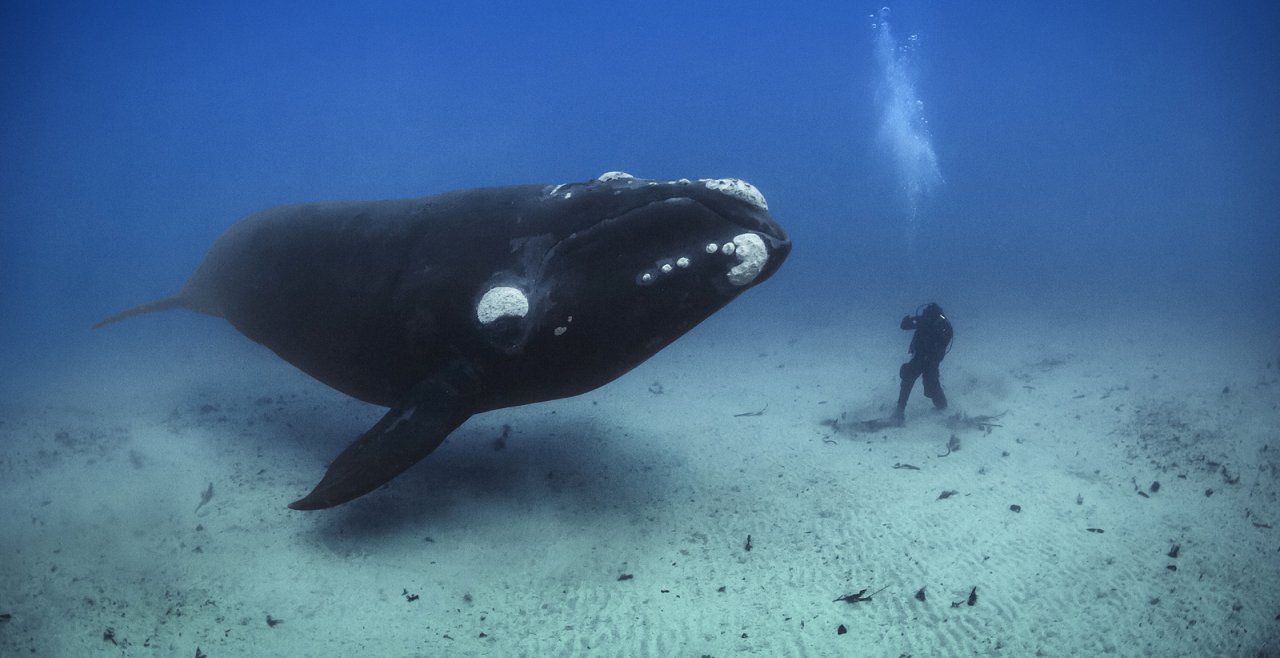
They have singing competitions, isolate themselves by dialects, stick to unique food preferences, are led by generations of older, wiser matriarchs, celebrate their tribe's identity, choose different parenting techniques, and gracefully mourn their dead.
They're just like us.
As generations of fans eagerly await a sequel to the biggest box-office hit in history, Avatar, its Hollywood heavyweight director James Cameron reveals some big secrets about another mysterious world he's putting on screen. This world is also inhabited by a highly cognitive, sentient species with huge brains, intricate social structures and complex communications skills.
This is another threatened "Pandora" that needs to be understood in order to be protected, but this world isn't from one of Cameron's science fiction blockbusters. It's right here on Earth, and the magical beings that roam and rule this world are cetaceans—or as they're more commonly referred to, whales.
Secrets of the Whales, National Geographic's new Disney+ documentary series premiering on April 22, is produced by Cameron and narrated by his longtime sci-fi film partner, Avatar and Avatar 2 award-winning actress and conservationist Sigourney Weaver.
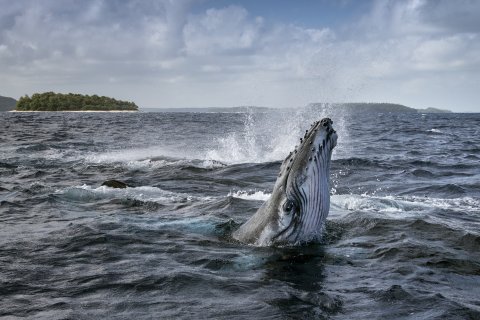
"I've been fascinated for years by whales, and this was an opportunity for me to follow my curious nose into an area that's not my area of expertise but certainly an area of curiosity and fascination, and bring a kind of storyteller's perspective to it," Cameron tells Newsweek via Zoom video.
Filmed over three years, this epic four-part docuseries follows the mysterious creatures across every ocean, 12 countries and six continents, including both polar regions, to show us their complex lives that few have witnessed so intimately until now.
These close encounters are the work of underwater photographer, National Geographic Explorer at Large Brian Skerry, as he tells the stories of the creatures he's been documenting, and even been accepted by, for over 40 years.
Although he might be best known for his Oscar-winning films such as Titanic and Avatar and science fiction blockbusters such as Aliens and Terminator, Cameron is also a National Geographic sea explorer and conservationist. In his documentary Deepsea Challenge, the film director made a record-breaking solo dive to the Earth's deepest point.
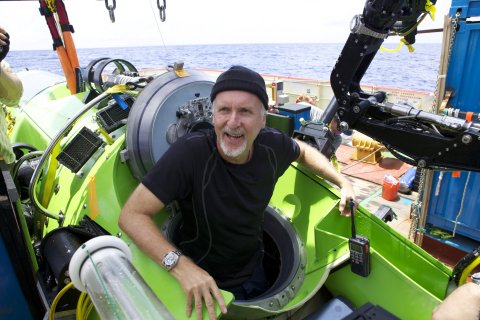
Merging his passions for cutting-edge technology and ocean exploration, Cameron teams up with Skerry, who won an "Underwater Oscar" in 2019 from the Academy of Underwater Arts and Sciences, to uncover the secret world of whales, with the help of advanced underwater technology. It gives us insight into their way of life, and the extraordinary culture of five different whale species: orcas, humpbacks, belugas, narwhals and sperm whales.
Getting Close to the Whales
Cameron shares in the foreword to Skerry's Secrets of the Whales companion photobook (National Geographic, April 6) that the two men share a similar drive to explore and create in the ocean depths: "We both grew up in landlocked, working-class towns, but were drawn to the sea," writes Cameron, adding that they both got their scuba certifications in YMCA pools.
"It was three years of painstakingly difficult hardship at sea, in very hard diving conditions. A lot of stuff I wouldn't know how to do, so I get to celebrate his [Skerry's] artistry and his craftsmanship," says Cameron, who is also a free diver and a scuba diver.
Skerry tells Newsweek the challenges of filming underwater included bad weather and finding elusive whales on the open sea, "We can go weeks or months with no sightings."
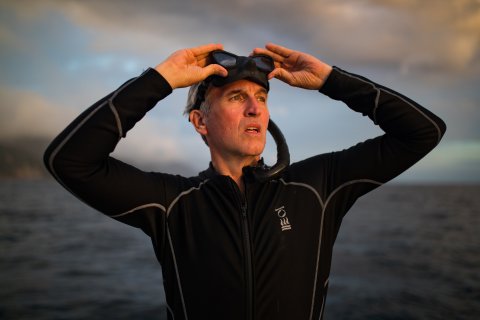
"So while three years sounds like a lot of time, in the world of filming whales, it is barely enough." SOTW filming captured many firsts though: a sperm whale calf feeding, and even a cross-species adoption is recorded when a beluga pod adopts a narwhal.
"How do you get close to these big animals and document them in such a dramatic and intimate way?" asks Cameron. "[Skerry] got them to trust him. They allowed him to get close." In the first episode, an orca even offers to share his meal with Sherry—a bloody stingray that he politely declines.
They're Just Like Us
"We have fantasies that they have these very complex, emotional lives and intelligence, but now we're seeing the evidence of what we kind of hoped and instinctually believed to be true about them," says Cameron, adding that Skerry now has the footage to prove it.
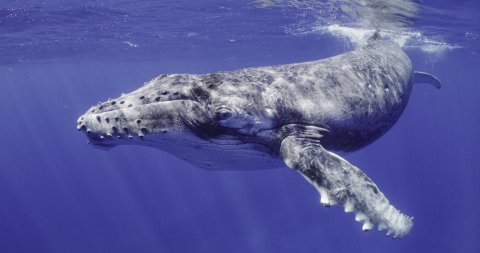
When a group of humpback whales that are not related to each other come together from various places around the world, Cameron describes it as "a bit like an annual gathering of friends that get together to hang out and have a beer" but instead "do their bubble net feeding strategy together in perfect coordination—almost like a dance."
The biggest secret about whales? They have complex lives, families and culture, much like humans, says Skerry, adding he thinks of it like "the neighborhoods of New York City at the turn of the last century with many enclaves of different cultures and languages. Orca have a preference for 'international cuisine.' The orca in New Zealand prefer stingrays, while the orca in Norway like herring."
"Moms teach their calves the skills they will need to survive, but they're also teaching them their cultural traditions. Humpbacks have 'singing competitions.' Beluga whales visit a 'summer resort' each year and play games. Whales celebrate their identity and grieve for the dead. They are an alien intelligence sharing this planet with us."
The Harm of Humans
So while Cameron was filming the Avatar sequel, Skerry was doing the fieldwork and capturing intimate whale encounters on film—including some nail-biting ones, "You're not out there observing whales for very long before you see the stress and injuries impacts of human civilization have on them," Cameron tells Newsweek, noting a rescue filmed when a National Geographic diver intervened to assist an orca entangled in a fisherman's rope and in danger of drowning.
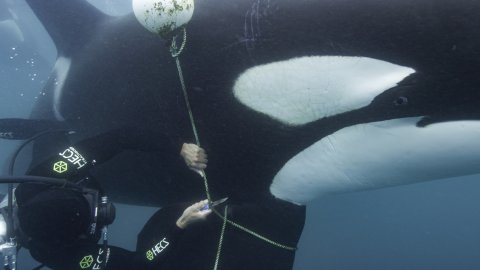
As Weaver narrates this harrowing moment, she adds that nearly a thousand of these air-breathing mammals die every day tied up in fishing lines. "The big male orca could easily kill the diver, but he seems to understand.…" says the Avatar actress in her iconic otherworldly voice.
"Pretty much everything we're doing as a civilization is injurious to them," Cameron says, from toxic water pollutants to sound pollution—from seismic testing to military sonar—that's highly toxic to whales who see their world by sound and use echolocation to hunt their prey.
This sound pollution is related to a lot of whale stranding, says Cameron, explaining that when a whale's hearing is damaged, it can't hunt or see properly, so it gets stranded. "Because of their social bonds [if] one gets stranded, the others go to help, and they get caught. This can snowball until you lose entire pods of hundred and hundred of whales."
First Awe, Then Advocacy
"You're not going to defend and protect what you don't love and what you don't care about. So getting people to care is the first step toward taking action," says Cameron.
"the great whales ... the other sentient beings that have the misfortune of sharing this big spaceship with us."
"There's a fundamental battle at work in human civilization, which is the war between the takers and the caretakers," Cameron continues."The takers see nature is that which we exploit, and that which we can make a profit from."
"So ask yourself, are you a taker or a caretaker? Are you voting for a taker or a caretaker?" Cameron adds that answers aren't always black and white, and are perhaps a "bit gray."
"If you use that sort of litmus test as a way to guide yourself through decisions, then you're a responsible citizen of the planet and you're taking care of the other citizens on the planet, which are the great whales ... the other sentient beings that have the misfortune of sharing this big spaceship with us."
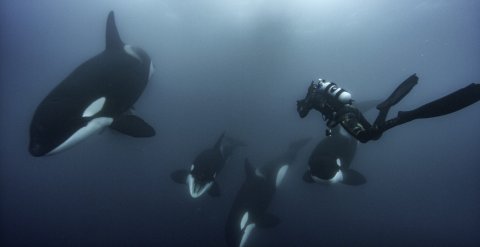
Another bit of advice from Cameron you might not like: "Eat less fish, how about that?"
A vegan for nine years, Cameron credits his good friend Sylvia Earle, her Deepness as she's known, for inspiring his choice. Earle was the first woman to walk the ocean floor and has been a National Geographic explorer-in-residence since 1998.
"She's been one of the most vocal advocates for the ocean through a very long and storied career and she always used to say to me: Look, if you want to save the fish, just don't eat them."
Cameron says he doesn't have much sympathy for commercial fishing, calling them "basically environmental rapists in my view," adding they're highly organized and they use advanced technology to wipe out the food web.
But the director quickly adds, "Now the Indigenous fishing people, they're not the problem. Let's let them do what they're doing, let's get rid of the other 90 percent, because this is what's wrecking up the entire food web. This is endangering the great whales; it's killing off, dolphins and porpoises, incredibly sentient emotional beings with complex social bonds and culture."
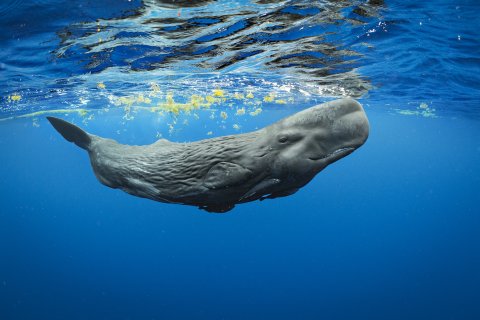
Skerry also hopes Secrets of the Whales will inspire people to care more about protecting the oceans, "If we know and can see that whales share love, playfulness, empathy, that they invest so much into their offspring and that they pass on ancestral traditions, we can begin to understand how very special the natural world is, and that we are not alone."
The Avatar Touch
Avatar was referred to as "the most epic piece of environmental advocacy ever captured on celluloid." And Cameron uses the same power of storytelling to not hit us over the head with advocacy in Secrets of the Whales. Instead, he invites us into their world to see how similar we are to these creatures, in the hopes that if we can relate to and also be awed by them, we will care about saving their homes and preserving their cultures.
In a "science fiction action romp in a fantasy world" like Avatar, Cameron says that he was able to raise consciousness about Indigenous rights and the threats to their culture.
By imagining a made-up culture on another planet with giant blue mythical creatures, Cameron got us to care. "Avatar 2 and Avatar 3 are much more emotion-focused. Again, it doesn't bang you over the head with a conservation message. It also doesn't tell you what to do. It's entertainment with a conscience."
Just as the Na'vi tribe greet others with "I see you" in Avatar's Pandora, Secrets of the Whales gives a similar acknowledgment: recognizing these sentient souls in the depths of the sea, with their profound existence and our connection and responsibility to protect them.
And despite everything we have done to their kind, they might even trust us.
But now, what will we do next?













